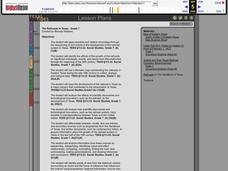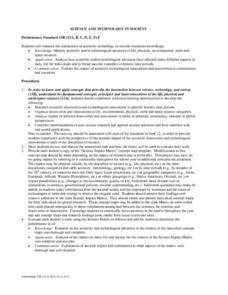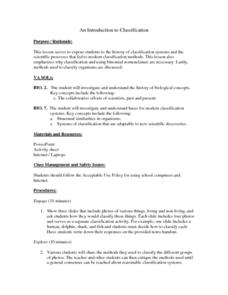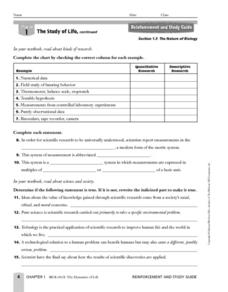Curated OER
Oil and its Everyday Uses
Explore the properties of oil through an experiment. They use the scientific process to investigate oil, participate in experiments, watch videos,and use information from the internet to determine how oil has changed our...
Virginia Department of Education
Current Applications in Science
High schoolers may claim to have no interest in scientific revelations and discoveries, but watch how quickly they download a new app onto their state-of-the-art smartphones. Scholars discuss the scientific or technological...
Sea World
Ocean Discovery
Immerse your young marine biologists in the world of marine animals. The lesson includes several activities that are age-appropriate for preschoolers and kindergartners, including coloring pages, gluing feathers and sand onto paper...
Biology Junction
Viruses, Viroids, and Prions
Are viruses living or non-living? According to the presentation, they are both and neither. Clearly, this requires clarification and an in-depth look at viruses, viroids, and prions. Young scientists learn about the history, structure,...
Curated OER
Becoming Whales: Experiencing Discoveries of
Students experience, through a "dig," the historical discovery of fossils which increasingly link whales to earlier land-dwelling mammals. They encounter the intermediate forms which show changes that lead to the modern whale.
Curated OER
Islamic Scientific Contributions to Civilization
Seventh graders explore several well documented artistic and scientific accomplishments that were discovered or perfected during The Golden Age of Islam. They are staff writers of a magazine who create a feature article about a topic...
Curated OER
Beach Combing: Evidence of Life
Young scholars comb the beach and gather remnants of unfamiliar life forms to make speculations about the origins of their discoveries. In this environments awareness instructional activity, students work in groups to search for evidence...
NASA
Einstein and His Times
Scholars research and present on the historical happenings of 1919. After sharing their findings, pupils debate about how Congress dealt with the moral issues of the time. The evaluation asks learners to write a persuasive...
Curated OER
Crickets Guided Discovery
Sixth graders investigate insect anatomy by analyzing a live cricket. In this insect science lesson, 6th graders discuss their knowledge of insects and describe their characteristics from memory. Students observe live...
Biology Junction
DNA and Replication
Enzymes proofread DNA, reducing the error rate to one in one billion base pairs. Learn about the important process and so much more with the help of a presentation. It opens with the history of DNA and the major scientific contributions...
ARKive
Species Discovery
How many of your students know that even today new species are being found all over the globe? Introduce them to the amazing diversity our planet houses with a creative activity about animal variation and classification. They'll use a...
ARKive
Species Discovery
How do you classify a newly discovered species? Learners view a presentation and complete research about biodiversity and the classification hierarchy. The lesson includes activities with dichotomous keys and work on classifying both...
Curated OER
Scientific Data: It's Not as Pretty as It Looks!
The difference between accuracy and precision is fundamental for high school science learners. Using test kits for nitrate concentration in water, they compare readings with each other. They consider the accuracy, precision, and bias of...
Teach Engineering
See the Genes
"If you can't explain it simply, you don't understand it well enough" - Albert Einstein. The sixth installment of a seven-part series teaches young scientists about the importance of being able to communicate scientific research and...
Curated OER
The Railroads in Texas
Seventh graders differentiate between, locate, and use primary and secondary sources, such as biographies from the Handbook of Texas. They analyze the effects of scientific discoveries and technological innovations, such as the railroad,...
Curated OER
High-Tech Windsocks
Students research chosen scientific discoveries and then create an imaginative windsock model of the invention. Students describe how their technology was invented and the impact the invention made upon others. Students display their...
Curated OER
Scientific Scenes
Students discover how the public's perceptions of science have changed throughout recent history; then research scientific and technological breakthroughs in a variety of areas. They then create plays that allow scientists to encounter...
University of Minnesota
Ethics of Dissection
There's an elephant in your classroom. That's right — a big, awkward elephant named Dissection. Sure, you'd like to talk about him ... but how? Whether you're a seasoned teacher or fresh out of student teaching, the topic of dissection...
Curated OER
SCIENCE AND TECHNOLOGY IN SOCIETY
Students research scientific discoveries and technological innovations. They organize discoveries and innovations in life, environmental, physical, earth and space science categories. They analyze impact of selected discoveries and...
Curated OER
Erosion Lab
Eighth graders explore variables that influence the rate of erosion due to the 4 major agents. They work as a group and practice conducting experiments according to the scientific method. Students comprehend that communicating ideas...
Curated OER
An Introduction to Classification
Sixth graders explore, analyze and study the history of classification systems and the scientific processes that influenced modern classification methods. They evaluate why classification and binomial nomenclature are necessary to the...
Curated OER
Mythbusters
Eighth graders watch an episode of Mythbusters and answer questions that arise in the video about the scientific process. In this Mythbusters lesson plan, 8th graders complete a scientific investigation based on the video.
Curated OER
The Study of Life
In this scientific research worksheet, students will complete a chart by determining if the statements given are examples of quantitative research or descriptive research. Then students will fill in the blank of 8 statements about the...
Curated OER
The Solar System: Why do we Explore?
Third graders act as scientists. In this property discovery lesson, 3rd graders explore the substance "Oobleck" (cornstarch, water, food coloring). They work in groups to investigate the substance and make observations as a scientist...























